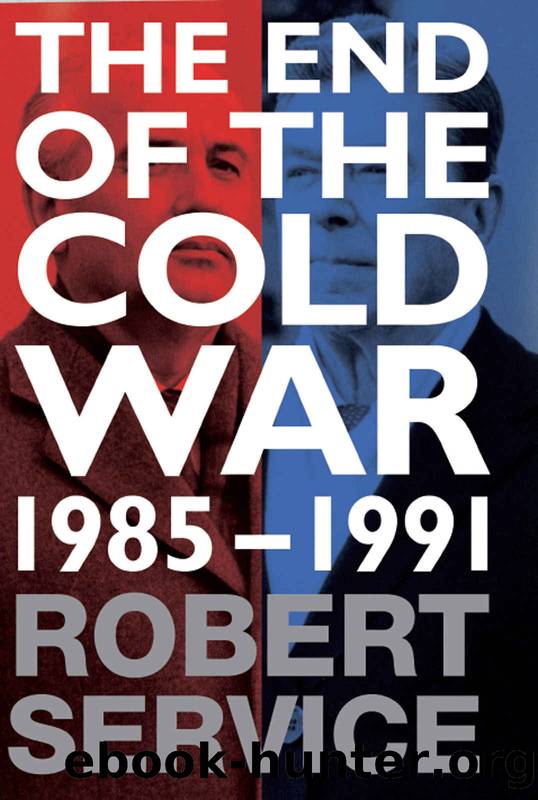The End of the Cold War: 1985 - 1991 by Robert Service

Author:Robert Service [Service, Robert]
Language: eng
Format: azw3
ISBN: 9781447287285
Publisher: Pan Macmillan
Published: 2015-10-07T16:00:00+00:00
29. THE LEAVING OF AFGHANISTAN
Strange as it may seem, questions about East Germany, Hungary and even Poland cropped up little in the talks between America and the Soviet Union. Afghanistan by contrast attracted ceaseless attention. The Americans since 1984 had included ‘regional conflicts’ on their agenda for talks with the USSR. For them, the Afghan question was a litmus test of Gorbachëv’s sincerity in changing his entire foreign policy. Reagan and Shultz made a constant demand for the pull-out of Soviet forces. Gorbachëv had indicated at the Geneva summit of November 1985, albeit in general terms, that he already had this in mind. His commitment increased in the years that followed, and he regularly read out searing letters to the Politburo from mothers who wished to know what was happening to their boys.
Most governments were pleased with the signs of incipient change in Moscow’s policy, but this was not true of all of them. Rajiv Gandhi and other Indians counselled Gorbachëv and Shevardnadze to tread with caution about how they left Afghanistan. They themselves sought to make trouble for the Pakistanis. They warned Kremlin leaders that Pakistan, an American ally, had the potential to move into any power vacuum in Kabul – a source of worry for both New Delhi and Moscow.1 Some African politicians visiting Moscow showed a similar caution about the projected military withdrawal of the Soviet Army; they warned that the USSR’s influence around the world would fade as ‘imperialism’ took its opportunity to go on the offensive.2 These were not the usual reactions to Gorbachëv’s initiative. Although Fidel Castro was no admirer of the Soviet perestroika, he gave warm approval to the retreat from Afghanistan. His grouse to Shevardnadze was that the invasion had always been a terrible mistake and had put the Cubans into ‘a completely impossible situation’.3 Gorbachëv had grounds for thinking that Castro was more in line with world opinion than Gandhi. He anyway saw no point in prolonging the army’s travails on Afghan soil.
Reagan could see no advantage for America in easing the USSR’s difficulties since he had no guarantee that the Politburo would not change its policy back to occupation. Soviet leaders had exploited American difficulties at the end of the Vietnam war, and now they were going to discover how that had felt. In March 1986 the President sanctioned measures to supply the mujahidin with Stinger missiles. The first such missiles soon arrived in Pakistan for onward dispatch to Afghanistan.4 Within months, the American intelligence agencies reported that the USSR had lost two transport planes and a helicopter to the new weapon.5 Weinberger received a roar of welcome on his visit to the Afghan refugee camps.6
The Politburo ignored these complications and stuck to the goal of withdrawal. On 11 June 1986, as a first step, it ordered the pulling out of six whole regiments. Defence Minister Sokolov spoke in favour. Gorbachëv commented that the return of the 8,000 troops stationed there would prove that the USSR had no pretensions to ‘the warm waters’ of the Indian Ocean.
Download
This site does not store any files on its server. We only index and link to content provided by other sites. Please contact the content providers to delete copyright contents if any and email us, we'll remove relevant links or contents immediately.
| Africa | Americas |
| Arctic & Antarctica | Asia |
| Australia & Oceania | Europe |
| Middle East | Russia |
| United States | World |
| Ancient Civilizations | Military |
| Historical Study & Educational Resources |
Red Famine: Stalin's War on Ukraine by Anne Applebaum(2465)
Chernobyl by Serhii Plokhy(2128)
Midnight in Chernobyl by Adam Higginbotham(2079)
The House of Government by Slezkine Yuri(1845)
Midnight in Chernobyl: The Untold Story of the World's Greatest Nuclear Disaster by Adam Higginbotham(1776)
Red Shambhala by Andrei Znamenski(1749)
The Gulag Archipelago (Vintage Classics) by Aleksandr Solzhenitsyn(1725)
From Cold War to Hot Peace by Michael McFaul(1712)
All the Kremlin's Men by Mikhail Zygar(1696)
Putin's Labyrinth(1656)
Red Notice by Bill Browder(1592)
The Future Is History by Masha Gessen(1591)
From Russia with Lunch by David Smiedt(1551)
A People's Tragedy by Orlando Figes(1544)
The Romanovs by Simon Sebag Montefiore(1487)
How to Tame a Fox (and Build a Dog): Visionary Scientists and a Siberian Tale of Jump-Started Evolution by Lee Alan Dugatkin & Lyudmila Trut(1469)
Putin's Labyrinth: Spies, Murder, and the Dark Heart of the New Russia(1455)
The Lost Spy by Andrew Meier(1398)
Art and Revolution by John Berger(1386)
